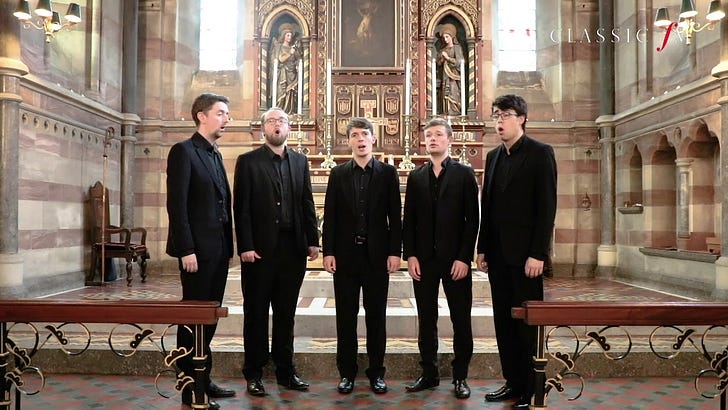Welcome back to our Musical Zodiac!
For Gemini/vocal harmony month, I had to include a group that blew my mind when I first learned about them in 2018. When you think about vocal ensembles (if you think about vocal ensembles), you may have a very specific expectation of performers breathing life into styles that are hundreds of years old.
Like the ones I’ve written about here:
Sing Like an Angel
In a world dominated by bouncy pop and lyrics that (if you’re lucky) drape a melody around a superficial cry of “Yolo!” many people never find their way inside the sacred pieces written in the 15th and 16th centuries.
But in 2013, a young, unknown student composer named Caroline Shaw took home the Pulitzer Prize for what the Pulitzer page describes as “inventive a cappella work uniquely embracing speech, whispers, sighs, murmurs, wordless melodies and novel vocal effects.” In her composition, Shaw used “yodeling, Korean p’ansori techniques, Georgian intonation inflections, as well as Inuit throat games and three different styles of Tuvan vocal practice–xöömei, kargyraa, and sygyt.”1
(Hey, we just learned about Tuvan vocal practice! WHAT A COINCIDENCE!)
You can get a small sample of the winning work here, and I included a video of the full piece at the end—I recommend you carve out some time for this!
How to Cross the Pop/Art Divide
Shaw and Roomful of Teeth were a surprising revelation to me when I went back to school in 2017, hoping to finally complete my music degree before turning 50. I first heard them as part of the listening homework assigned by Dr. Aaron Zeigler at Towson University, and I was so excited by the piece, I went to class the next day eager to talk to my 20-something classmates about this amazing work.
They were less impressed.
One young man rolled his eyes and explained that his choral director in high school had been so excited by Roomful of Teeth, they had attempted to have their group perform a selection from Partita for 8 Voices in his junior year. And, in his opinion, it didn’t go well! My other classmates seemed more interested in emulating the cast of Glee, becoming the next Idina Menzel or Pentatonix.
So, even though Shaw’s age puts her closer to them in terms of the generational divide, the fact that their younger (than me) faculty were excited by the work being done by Roomful of Teeth made this amazing and innovative music feel like something that belonged to the Olds. Like me.
Not that they haven’t had their impact on the broader culture. You can hear parts of Partita… in the soundtrack for the German sci-fi thriller, Dark, which ran from 2017 to 2020.
You can also explore the group’s discography on their website, and on Bandcamp, you can preview their most recent work from 2023:
I’m still in that exploration stage, so if you find a piece that stands out, be sure to say so in the comments!
For me, the thing that makes Shaw’s compositions (and the other composers who are represented by Roomful of Teeth) stand out is the way they weave the vocal techniques on display into their work. The sounds are not just an effect, but are part of the palette being used to paint a portrait.
In contrast, one of my favorite bands released an album in 2012 that featured a Tuvan throat singer in the intro to their opening number:
The sound evoked a distant and ancient mysticism, followed by the sounds of a choir singing in Latin—also ancient, but more recent in contrast. And the song itself deals with themes exploring the human need to create a spiritual world to deal with the painful aspects of reality. The vocal techniques on display aren’t the point of the song, but are used to set a mood.
But in Shaw’s hands, the colors and textures created by the group are central to the compositions they are performing. Take away Dream Theater’s intro, and Bridges In the Sky remains an epic prog metal piece; take away the techniques required to perform Partita for 8 Voices, and you end up with a strange avant-garde madrigal.
This, to me, is what separates what we call “popular music” from what we call “art music”—a willingness to turn the language of music on its head, and take the risk that your new “musical vocabulary” will only speak to a small handful of people.
As Promised…
The group performing the whole Pulitzer Prize-winning piece:
Next week, I have one more vocal harmony topic to cover, and it is a topic I tend to neglect on this ‘Stack: heavy metal voices.






